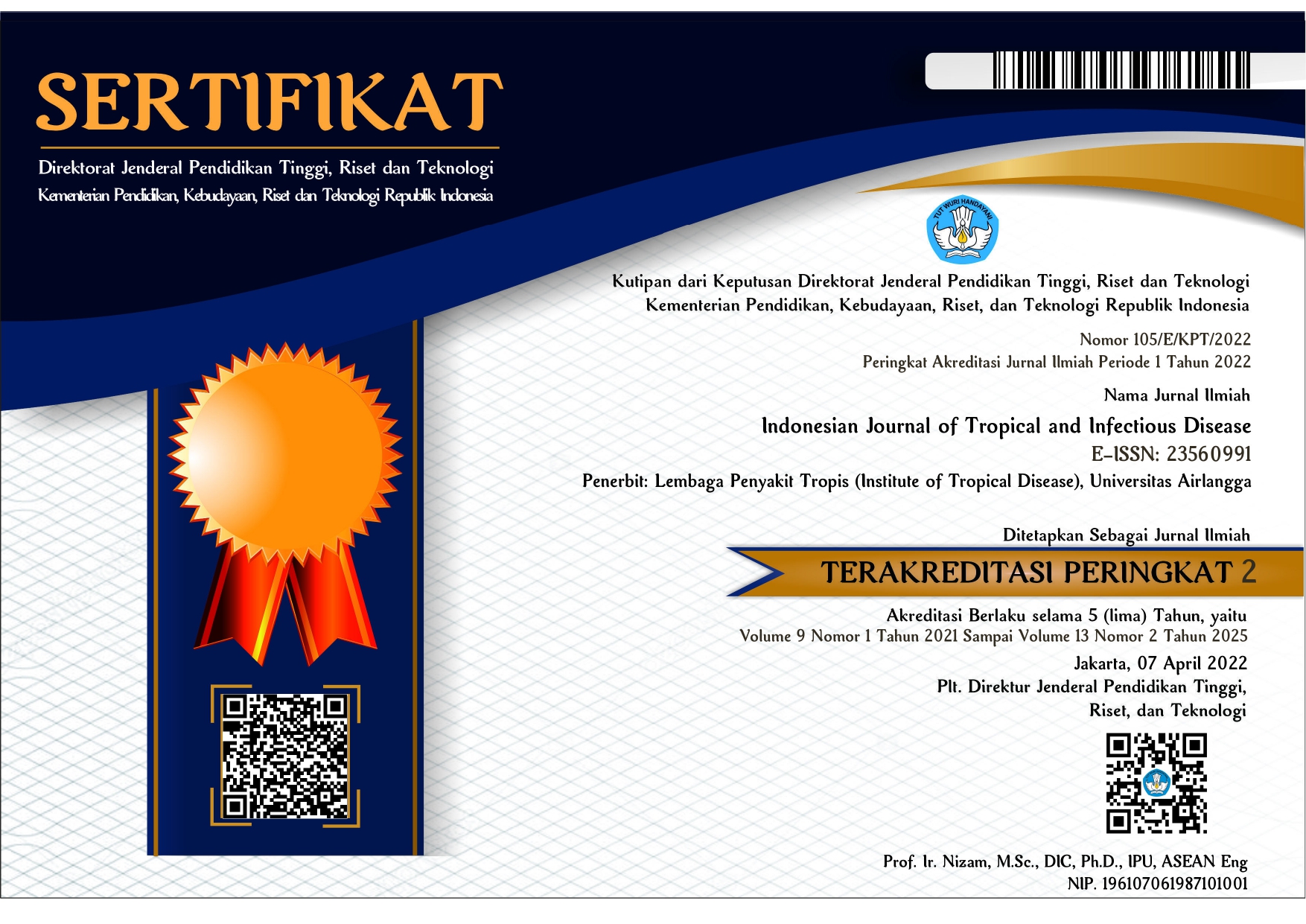The Existence of Leptospira interrogans on Rats and The Transmission Potency in Public Areas: School, Traditional Market, and Settlement in Yogyakarta
Downloads
Leptospirosis is a zoonotic disease caused by bacterial infection, Leptospira interrogans. Indonesia is known for being an endemic country of this disease and Yogyakarta Special Province has become one of the regions with high cases of Leptospirosis. There was lack of information on the L. interrogans prevalence on rats at the public areas, such as school and traditional market. This research was conducted to determine and predict the potential Leptospirosis transmission in public areas, especially in schools, traditional markets,. and the settlement of Yogyakarta. Wild rats were collected from several public places (elementary schools, traditional markets, and Settlement areas) by using single live traps. The rat's blood was centrifuged to obtain the serum. The serum was tested by using immunochromatography of Leptotek Lateral Flow. The collected rats and shrews were euthanized and then identified for the species and the morphological features. Total of 27 rats (67.5%) and shrews 13 (32.5%) were collected. There were six species of collected rats, namely Rattus argentiventer, Rattus norvegicus, Rattus tanezumi, Rattus tiomanicus, and Bandicota bengalensis, while the collected shrew species was Suncus murinus. The rats and shrews from traditional market were negative with L. interrogans, however the positive results was in elementary schools (14.28%), that were from R. norvegicus and S. murinus, moreover the positive infection also showed in the settlements (57.14%), that were from R. argentiventer, R. norvegicus, and R. tiomanicus. These findings indicated that school and settlement must be a concern for the leptospirosis transmission.
World Health Organization.
Leptospirosis: Prevention and Control in
Indonesia. 2020.
https://www.who.int/indonesia/news/det
ail/24-08-2020-leptospirosis-preventionand-control-in-indonesia
Kementerian Kesehatan Republik
Indonesia. Petunjuk Teknis
Pengendalian Leptospirosis. Jakarta:
Kementerian Kesehatan Republik
Indonesia; 2017.
Premarathne SS, Gamage C, Chandrajith
R, Ratnatunge NV, Wijetunge S, Wazil
A, et al. Leptospirosis: A Potential
Culprit for Chronic Kidney Disease of
Uncertain Etiology. Nephron. 2023 Feb
;1-10.
Widjajanta W. Epidemiologi, Diagnosis,
dan Pencegahan Leptospirosis. JHECDs.
Dec 2;5(2):62-68.
Kementerian Kesehatan Republik
Indonesia. Profil Kesehatan Republik
Indonesia Tahun 2016. Jakarta:
Kementerian Kesehatan Republik
Indonesia; 2017.
Dinas Kesehatan Provinsi D.I.
Yogyakarta. Profil Kesehatan Provinsi
D.I. Yogyakarta Tahun 2011.
Yogyakarta: Dinas Kesehatan D.I.
Yogyakarta; 2012.
Rakebsa D, Indriani C, Nugroho WS.
Epidemiologi leptospirosis di
Yogyakarta dan Bantul. BKM Journal of
Community Medicine and Public Health.
Apr 20;34(4):153-158.
Widiastuti D, Djati AP. Deteksi
Leptospira Patogen pada Tersangka
Penderita Leptospirosis di Kabupaten
Ponorogo. Spirakel. 2017; 7(1):7 -13.
http://ejournal.litbang.depkes.go.
id/index.php/spirakel/article/vie
w/6126
Astuti RRUNW, Romadhona DL,
Salsabila S, Febrianti MW, Kusumastuti
OH, Setiawan YD. Rats Distribution and
Diversity: Leptospirosis Transmission
Mapping in Urban Areas in Yogyakarta
City. 2023. Biosaintifika. [in review]
Kumalasari RC. Hubungan Sanitasi
dengan Status Bakteriologi (Status
Koliform dan Keberadaan Salmonella
sp.) pada Jajanan di Sekolah Dasar
Wilayah Kecamatan Tembalang,
Semarang. JKM UNDIP. 2016
Apr;4(3):98-107.
Malaka MH, Ruslin, Rafhisya ZD, Fadli
M, Ihsan S, Fitrawan LOM, Fristiohady
A. Aktualisasi Perilaku Hidup Bersih dan
Sehat pada Siswa Sekolah Dasar di
Kecamatan Kambu dan Poasia. Jurnal
Mandala Pengabdian Masyarakat. 2020
Jun;1(1):25-32.
Ernawati D, Priyanto D. Pola Sebaran
Tikus Habitat Pasar Berdasarkan Jenis
Komoditas di Pasar Kota Banjarnegara.
BALABA. 2013 Dec;9(2):58-62.
Thohira MC, Rahman F. Tata Kelola
Sanitasi Lingkungan Pasar Rakyat
Menuju Pasar Sehat Era New Normal di
Kota Yogyakarta. Higiene. 2021 Sept.-
Dec;7(3):110-118.
Saragih RKP, Martini, Tarwatjo U. Jenis
dan Kepadatan Tikus di Panti Asuhan
"X” Kota Semarang. JKM UNDIP. 2019
Jan;7(1):260-270.
Kementerian Kesehatan Republik
Indonesia. Pedoman Pengendalian Tikus
dan Mencit. Jakarta: Kementerian
Kesehatan; 2015.
Ristiyanto, Wibowo T, Budiharta S,
Supargiono. Prevalensi Tikus Terinfeksi
Leptospira interrogans di Kota
Semarang, Jawa Tengah. Vektora. 2015
Oct;7(2):85-92.
Pinardi T. Teknik Survei dan Identifikasi
Tikus. Ponorogo: Forum Ilmiah
Kesehatan; 2017.
Sholichah Z. Mengenal Jenis Tikus.
Jurnal Litbang Pengendalian Penyakit
Bersumber Binatang Banjarnegara. 2007
Dec;5(2):18 – 19.
Dewi DI. Tikus Sawah (Rattus
argentiventer, Robinson & Kloss 1916).
Jurnal Litbang Pengendalian Penyakit
Bersumber Binatang Banjarnegara. 2010
Jun;6(1):22 – 23.
Aplin KP, Brown PR, Jacob J, Krebs CJ,
Singleton GR. Field Methods for Rodent
Studies in Asia and The Indo-Pacific.
Canberra: Australian Centre for
International Agricultural Research;
Widayani HA, Susilowati S. Identifikasi
Tikus dan Cecurut di Kelurahan
Argasoka dan Kutabanjarnegara
Kecamatan Banjarnegara Kabupaten
Banjarnegara Tahun 2014. Jurnal
Kesehatan. 2014 Jun;10(1):27 – 30.
Dewi WM, Partaya, Susanti R.
Prevalensi Ektoparasit pada Tikus
Sebagai Upaya Pemetaan Risiko
Zoonosis di Kawasan Rob Kota
Semarang. Jurnal Ekologi Kesehatan.
Dec;18(3):171-182.
Gaston KJ, Jackson S, Salazar LC, Pinon
GC. The Ecological Performance of
Protected Areas. The Annual Review of
Ecology, Evolution and Systematics.
Oct;39(1):93 – 113.
Yuliawati S, Hestiningsih R, Martini,
Kusariana N, Haryanto S. Pengaruh
Pendidikan Kesehatan Terhadap
Peningkatan Pengetahuan dan penurunan
Kepadatan Tikus di Sumurboto,
Kecamatan Banyumanik, Semarang.
Vektora. 2019 Jun;11(1):47-52.
Wijayanti T, Marbawati D.
Keanekaragaman, Deteksi dan Peranan
tikus terhadap Penularan
Toksoplasmosis di Kabupaten
Banjarnegara. Jurnal Litbang
Pengendalian Penyakit Bersumber
Binatang Banjarnegara. 2018
Dec;14(2):169 - 180.
Daniswara S, Martini M, Kusariana N,
Hestiningsih R. Analisis Spasial
Kepadatan Tikus di Pasar Simongan dan
Pemukiman Sekitarnya Kota Semarang.
Jurnal Ilmiah Mahasiswa. 2021
Apr;11(2):29 – 34.
Maibang WG, Martini M, Santoso L.
Kepadatan Tikus dan Ektoparasit yang
Tertangkap di Pasar Jatingaleh dan Pasar
Kedung Mundu Kota Semarang. JRKM.
Jan 30;3(1):1-9.
Kastiri L. Survei Keberhasilan
Penangkapan (Trap Success) Mamalia
Kecil dan Kepadatan Pinjal di Pondok
Pesantren Krapyak Yogyakarta.
Undergraduate Thesis UNDIP; 2007.
Haidar M, Rizwar, Darmi, Putra AH.
Preferensi Tikus Terhadap Beberapa
Jenis umpan Yang Berbeda di Kawasan
Pemukiman. BIOEDUSAINS : Jurnal
Pendidikan Biologi dan Sains. 2022
Jun;5(1):137 – 142.
Astuti DR. Keefektifan Rodentisida
Racun Kronis Generasi II Terhadap
Keberhasilan Penangkapan Tikus. Jurnal
Kesehatan Masyarakat. 2013
Jan;8(2):183-189.
Setyaningrum AD. Jenis Tikus dan
endoparasit Cacing Dalam Usus Tikus
Di Pasar Rasamala Kelurahan Srondol
Wetan Kecamatan Banyumanik Kota
Semarang. Jurnal Kesehatan
Masyarakat. 2016 Apr;4(3):50 – 59.
Ramadhani T, Yunianto B. Reservoir
dan Kasus Leptospirosis di Wilayah
Kejadian Luar Biasa. Jurnal Kesehatan
Masyarakat Nasional. 2012
Nov;7(4):162-168.
Joharina AS, Putro DBW, Ardanto A,
Mulyano A, Trapsilowati W. Identifikasi
Hewan Reservoir di Daerah Peningkatan
Kasus Leptospirosis di Desa Pagedangan
Ilir, kecamatan Kronjo, Kabupaten
Tangerang Tahun 2015. Vektora. 2018
Jun.;10(1):59-66.
Himsworth CG, Bidulka J, Parsons KL,
Feng AY, Tang P, Jardine CM, Kerr T,
Mak S, Robinson J, Patrick DM. Ecology
of Leptospira interrogans in Norway rats
(Rattus norvegicus) in an inner-city
neighborhood of Vancouver, Canada.
PLoS Negl Trop Dis. 2013 Jun 20;7(6):
-9.
Thibeaux R, Iraola G, Ferrés I, Bierque
E, Girault D, Soupé-Gilbert ME,
Picardeau M, Goarant C. Deciphering
the unexplored Leptospira diversity from
soils uncovers genomic evolution to
virulence. Microb Genom. 2018 Jan;
(1):1-10.
Cosson JF, Picardeau M, Mielcarek
Buchy P, Jittapalapong S, Herbreteau V,
Morand S. Epidemiology of Leptospira
transmitted by rodents in Southeast Asia.
Plos Neglected Tropical Diseases, 2014;
(6):1 – 10.
Ikawati B, Sunaryo, Widiastuti D.
Dominant Factors Influencing
Leptsopira sp. Infection in Rat and
Suncus. Health Science Journal of
Indonesia. 2012 Dec 2; 3: 95-98.
Sunaryo S, Priyanto D. Leptospirosis in
rats and livestock in Bantul and
Gunungkidul district, Yogyakarta,
Indonesia. Veterinary World. 2022
Jun;15(7):1449-1445.
Nurbeti M, Kusnanto H, Nugroho WS.
Analisis Spasial Kasus Leptospirosis di
Perbatasan Kabupaten Bantul, Sleman,
dan Kulon Progo. Kes Mas: Jurnal
Kesehatan Masyarakat. 2016 Mar;
(1):1 – 10.
Ramadhani T, Widiastuti D. Identifikasi
Serovar Bakteri Leptospira Pada Tikus
Kaitannya Dengan Kejadian
Leptospirosis Di Beberapa Kabupaten Di
Provinsi Jawa Tengah. Jurnal
Pembangunan Manusia. 2014
Jul;8(3):188 – 201.
Ramadhani T, Widyastuti D, Priyanto D.
Determinasi serovar bakteri Leptospira
pada reservoir di kabupaten Banyumas.
Jurnal Ekologi Kesehatan. 2015
Mar;14(1):8 – 16.
Sambasiva RR, Naveen G, Bhalla P,
Agarwal SK. Leptospirosis in India and
the Rest of the World. BJID. 2003 Jun;
:178-193.
KEMENTAN. Ajak Masyarakat
Waspadai 15 prioritas Zoonosis. 2023.
https://peternakan.kaltimprov.go.id/artik
el/kementerian-pertanian-ajakmasyarakat-mewaspadai-15-zoonosisprioritas. Referenced: July, 28 2023.
Copyright (c) 2023 Indonesian Journal of Tropical and Infectious Disease

This work is licensed under a Creative Commons Attribution-NonCommercial-ShareAlike 4.0 International License.
The Indonesian Journal of Tropical and Infectious Disease (IJTID) is a scientific peer-reviewed journal freely available to be accessed, downloaded, and used for research. All articles published in the IJTID are licensed under the Creative Commons Attribution-NonCommercial-ShareAlike 4.0 International License, which is under the following terms:
Attribution ” You must give appropriate credit, link to the license, and indicate if changes were made. You may do so reasonably, but not in any way that suggests the licensor endorses you or your use.
NonCommercial ” You may not use the material for commercial purposes.
ShareAlike ” If you remix, transform, or build upon the material, you must distribute your contributions under the same license as the original.
No additional restrictions ” You may not apply legal terms or technological measures that legally restrict others from doing anything the license permits.























